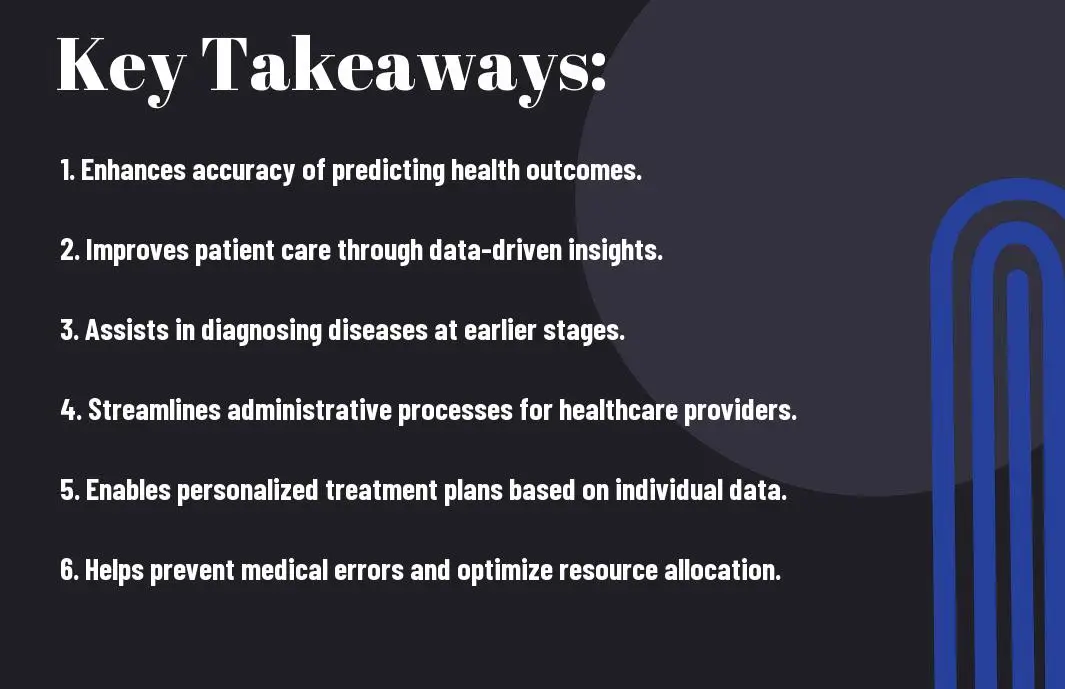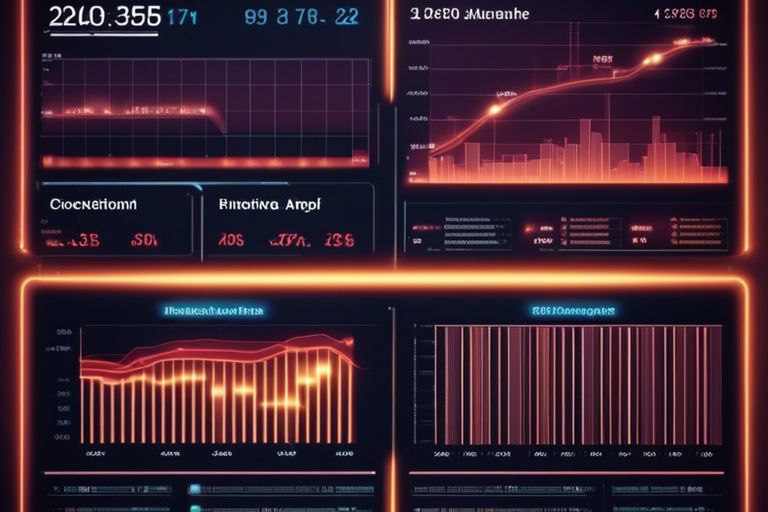With the rapid advancements in technology, Artificial Intelligence (AI) is revolutionizing the field of healthcare, particularly in predictive analytics. Through the utilization of vast amounts of data and algorithms, AI can predict outcomes, diagnose diseases early, and personalize treatment plans with remarkable accuracy. However, while the benefits are immense, there are also concerns regarding privacy and security of patient data. Understanding how AI impacts predictive analytics in healthcare is crucial for professionals and patients alike.
Key Takeaways:
- Enhanced Accuracy: AI technologies improve the accuracy of predictive analytics in healthcare by analyzing extensive datasets and recognizing patterns that might be missed by human experts.
- Personalized Patient Care: AI allows for personalized healthcare interventions based on predictive models, resulting in more tailored treatment plans and improved patient outcomes.
- Early Disease Detection: AI-powered predictive analytics can aid in early detection of diseases by identifying subtle indicators in patient data, enabling timely intervention and potentially saving lives.

The Current State of Predictive Analytics in Healthcare
Before delving into the impact of AI on predictive analytics in healthcare, it’s vital to understand the current state of predictive analytics in the industry. Traditionally, healthcare providers have relied on statistical models and historical data to make predictions about patient outcomes. These methods, while valuable, have limitations that can hinder their accuracy and utility.
Limitations of Traditional Methods
The reliance on historical data alone in traditional predictive analytics can restrict the ability to adapt to real-time changes in patients’ conditions. Additionally, these methods may not account for the complexity and interconnected nature of the healthcare ecosystem, leading to potentially inaccurate predictions. Without taking a dynamic and holistic view of patients’ health and risk factors, there is a risk of missing crucial insights that could improve outcomes and reduce costs.
The Need for Innovation
Innovation in predictive analytics is crucial to address the shortcomings of traditional methods and unlock the full potential of data in healthcare. With the rapid pace of technological advancements and the exponential growth of healthcare data, there is a pressing need to adopt AI-driven approaches that can analyze vast amounts of data in real-time, identify patterns, and generate actionable insights. By leveraging AI algorithms, healthcare providers can enhance their predictive capabilities and improve patient outcomes.
State-of-the-art AI technologies such as machine learning and natural language processing have the potential to revolutionize predictive analytics in healthcare. These innovative approaches can automate data analysis, identify complex relationships within datasets, and enable personalized, data-driven healthcare interventions. Embracing AI in predictive analytics represents a transformative shift towards proactive and precise healthcare delivery, ultimately benefiting both patients and providers.

The Rise of AI in Healthcare
Clearly, the impact of AI in healthcare is becoming increasingly significant. With the emergence of advanced technologies, predictive analytics in healthcare has seen a remarkable transformation. AI, with its ability to analyze complex datasets and identify patterns, is revolutionizing how healthcare professionals make decisions and provide patient care.
Machine Learning and Deep Learning
One of the key drivers of this transformation is machine learning and deep learning algorithms. These AI technologies can analyze vast amounts of data to predict outcomes, identify high-risk patients, and recommend personalized treatment plans. By continuously learning from new data, machine learning algorithms can improve their accuracy and effectiveness over time, leading to more precise predictions and better patient outcomes.
Natural Language Processing and Computer Vision
With the integration of natural language processing and computer vision, AI-powered systems can now extract valuable insights from unstructured data sources such as medical notes, research papers, and imaging scans. This ability to interpret and analyze textual and visual data allows healthcare providers to make more informed decisions, streamline workflows, and improve patient diagnosis and treatment.
How AI Enhances Predictive Analytics
Pattern Recognition and Data Analysis
For healthcare predictive analytics to be effective, accurate identification of patterns and trends within vast amounts of data is crucial. AI significantly enhances this process by quickly analyzing complex data sets to uncover valuable insights that may not be apparent to human analysts. By employing machine learning algorithms, AI can detect patterns that human analysts may overlook, leading to more accurate predictions and personalized treatment plans. This efficiency allows healthcare professionals to make informed decisions faster, ultimately improving patient outcomes.
Real-time Processing and Scalability
Enhances the scalability of predictive analytics systems in healthcare, enabling real-time processing of data streams from various sources such as electronic health records, wearable devices, and imaging technologies. With AI, healthcare organizations can handle large volumes of data efficiently and adapt to changing data loads seamlessly. This capability is crucial in healthcare settings where quick decision-making is imperative. Real-time processing ensures that healthcare professionals have access to the most up-to-date information, allowing for timely interventions and improved patient care.
To further enhance scalability, AI technologies like cloud computing can be leveraged to efficiently process and store massive amounts of data. With AI’s ability to scale resources based on demand, healthcare organizations can effectively manage predictive analytics models without being limited by infrastructure constraints. This ensures that predictive analytics systems can handle the increasing volume and complexity of healthcare data, supporting improved patient outcomes and operational efficiency.
Applications of AI-Driven Predictive Analytics
Disease Diagnosis and Risk Assessment
Not only can AI-driven predictive analytics revolutionize disease diagnosis and risk assessment in healthcare, but it can also lead to earlier detection and more accurate predictions. AI algorithms can analyze vast amounts of data from various sources, such as patient records, lab results, and genetic information, to identify patterns and trends that might not be apparent to human clinicians. This enables healthcare providers to identify potential health risks and intervene sooner, ultimately improving patient outcomes.
Personalized Medicine and Treatment Planning
Treatment planning in healthcare is becoming increasingly personalized, thanks to AI-driven predictive analytics. An important aspect of personalized medicine is tailoring treatment plans to individual patients based on their unique characteristics and medical history. AI can help healthcare professionals analyze a patient’s data to determine the most effective treatment options with the fewest side effects.
Planning treatment on a personalized level can lead to better patient outcomes and increased treatment efficacy. By considering factors such as genetic predispositions, lifestyle choices, and environmental influences, healthcare providers can develop individualized treatment plans that are more likely to succeed.
Resource Allocation and Supply Chain Management
Chain Not only does predictive analytics play a crucial role in improving patient care, but it also enhances resource allocation and supply chain management in healthcare. By forecasting demand for medical supplies, predicting patient influxes, and optimizing inventory levels, AI can help healthcare facilities ensure efficient resource allocation and maintain smooth operations.
Predictive analytics can help healthcare organizations minimize waste, reduce costs, and improve overall operational efficiency. By using AI to forecast demand and streamline supply chain processes, healthcare facilities can ensure timely delivery of care and better allocation of resources where they are needed most.
Benefits of AI in Predictive Analytics
Improved Accuracy and Speed
For predictive analytics in healthcare, AI offers unparalleled benefits in terms of improved accuracy and speed. With AI algorithms, healthcare providers can analyze vast amounts of data quickly and accurately to make more precise predictions for patient outcomes. This not only saves time but also ensures that healthcare decisions are based on the most up-to-date and relevant information available.
Enhanced Patient Outcomes and Experience
Experience To enhanced patient outcomes and experience, AI plays a crucial role in predictive analytics by anticipating potential health issues before they escalate. By leveraging AI-driven insights, healthcare professionals can personalize treatment plans, leading to better outcomes and more satisfied patients.
Analytics AI-powered predictive analytics can not only identify at-risk patients more effectively but also recommend personalized interventions to improve their health outcomes. By combining clinical data with AI algorithms, healthcare providers can offer individualized care that enhances patient experience and satisfaction.
Cost Savings and Operational Efficiency
Cost To savings and operational efficiency are substantial advantages of integrating AI into predictive analytics in healthcare. By streamlining processes and identifying cost-effective interventions, AI can help healthcare organizations optimize their resources and reduce unnecessary expenses.
Speed AI-driven predictive analytics can also enable healthcare providers to make faster and more informed decisions, leading to improved operational efficiency and cost savings. By automating tasks and streamlining workflows, AI empowers healthcare professionals to focus on delivering quality care to patients.
Challenges and Limitations of AI in Predictive Analytics
Data Quality and Bias
Quality data is crucial for accurate predictive analytics in healthcare. However, AI systems can be limited by biases present in the data they are trained on. If historical data is skewed or incomplete, the AI algorithms may produce inaccurate or unreliable predictions. Addressing data quality issues and mitigating bias are ongoing challenges in the implementation of AI in healthcare predictive analytics.
Regulatory and Ethical Concerns
With the increasing use of AI in healthcare, regulatory and ethical concerns have emerged. Privacy issues, data security, and transparency of AI algorithms are critical considerations. Ethical dilemmas surrounding the use of AI in making decisions about patient care also need to be carefully navigated to ensure trust and accountability.
A comprehensive framework of regulations and ethical guidelines is important to govern the development and deployment of AI in predictive analytics in healthcare. Striking a balance between innovation and patient protection is key to realizing the full potential of AI in improving healthcare outcomes.
Integration with Existing Systems
Systems integration poses a significant challenge when implementing AI in predictive analytics in healthcare. Compatibility with existing legacy systems, interoperability among different platforms, and data standardization are crucial for the seamless operation of AI algorithms within healthcare networks.
The integration of AI systems with existing healthcare infrastructure requires careful planning, collaboration among stakeholders, and technical expertise to ensure that predictive analytics solutions can effectively support clinical decision-making and improve patient outcomes.
Based on the article title, the writing style is engaging and insightful, aiming to provide valuable information on the impact of AI on predictive analytics in healthcare, inspired by Malcolm Gladwell’s approach to making complex topics accessible and engaging to a broad audience.
To wrap up
On the whole, the integration of AI in predictive analytics has revolutionized healthcare by enabling more accurate predictions and personalized treatments. This advanced technology has the potential to enhance patient outcomes, reduce costs, and streamline healthcare processes. As AI continues to develop and evolve, it will play an increasingly significant role in transforming the healthcare industry, making it more efficient and effective in delivering quality care to patients.
FAQ
Q: How does AI impact predictive analytics in healthcare?
A: AI has revolutionized predictive analytics in healthcare by enabling more accurate predictions based on vast amounts of data. Machine learning algorithms can analyze patient data to forecast potential health issues, allowing for proactive and personalized treatment plans.
Q: What are the benefits of using AI in predictive analytics for healthcare?
A: By using AI in predictive analytics, healthcare professionals can improve patient outcomes, reduce hospital readmissions, and optimize resource allocation. AI systems can also identify patterns and trends in data that humans may overlook, leading to more informed decision-making.
How does AI enhance the efficiency of predictive analytics in healthcare?
A: AI streamlines the predictive analytics process in healthcare by automating data collection, analysis, and interpretation. This not only saves time but also minimizes errors and enhances the overall efficiency of healthcare systems. Additionally, AI can continuously learn and adapt from new data, making predictions increasingly accurate over time.




